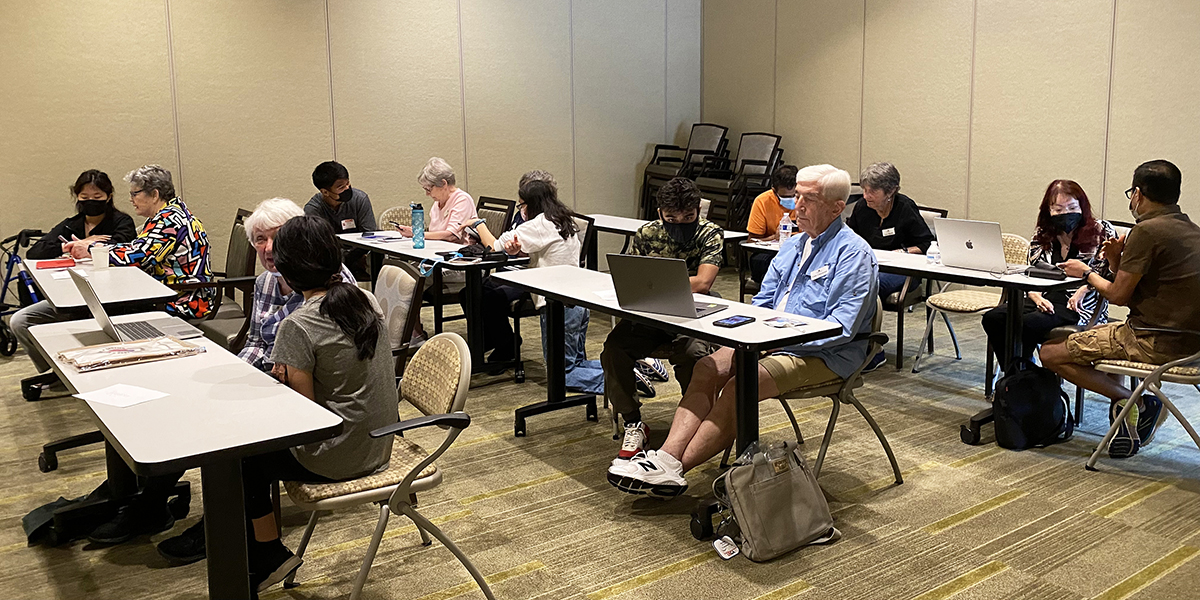Federal ARPA Funds Support Local COVID Relief

On March 11, 2021, President Biden signed the American Rescue Plan Act (ARPA) into law. ARPA provided $1.9 trillion in federal funds to enable states, counties, tribal and local entities to recover from the COVID-19 pandemic. Thanks to work of Aging Network advocates, $1.43 billion of ARPA funds were awarded for Older Americans Act services—services that millions of older adults, adults with disabilities, and caregivers rely upon for nutrition, healthy aging, transportation, caregiver support, and more.
As an awardee of local funds, Aging and Disability Services’ (ADS) priorities were to support community service providers to meet rapidly growing service demands, maintain existing pandemic relief efforts, and reach Black, Indigenous and People of Color (BIPOC) communities that have been most impacted by the pandemic. In addition, ADS sought to explore new social connectivity projects—activities that would prevent and mitigate the impact of extended isolation experienced by older adults, adults with disabilities and caregivers during pandemic.
ARPA was an unprecedented investment. We’re currently in the process of evaluating our first full year of funding. Evaluation will tell us how well we are addressing our priorities and whether we are reaching communities most impacted by the pandemic. It will also inform our understanding of ongoing funding levels needed to address the needs of older adults, adults with disabilities and caregivers.
In the meantime, we wanted to reach AgeWise readers, many of whom helped advocate for relief funding, with a few updates from year one:
- Congregate and home-delivered meal programs experienced substantially increased food, supply, and personnel costs due to the pandemic. In addition, service providers saw demand for meals exceed their budgets. ARPA funds were used to help sustain provider operations, continuing and scaling efforts that had been funded through other relief grants. ARPA funds supported new service models (e.g., to-go meals, groceries), increased meals, and costs of temporary workers to meet service demands. In 2022, ARPA funds contributed to the distribution of more than 300,000 emergency meals and 6,800 groceries.
- Extended and intense caregiver responsibilities during the pandemic drove more need and demand for caregiver support services. ARPA funds were used to maintain increased caregiver counseling capacity and resulted in 72 additional hours of mental health counseling in 2022.
- ARPA funds enabled ADS to make one-time investments that would provide benefits over many years. More specifically, funds supported development of a multilingual online Senior Farmers Market Nutrition Program (SFMNP) application, which launched for the 2022 enrollment period. SFMNP program applications have historically only been accessible via paper applications and mail. In addition, funds were used to support one-on-one online application assistance for older adults who needed assistance with the web application and had had no one available to help.
- Indeed, the pandemic brought with it a sudden shift to digital life. Technology became essential to staying socially connected, receiving health care, and accessing essential goods and services. Yet many older adults struggle to access available and affordable devices, internet services, technical and navigation support. The pandemic exacerbated this already present divide, particularly among BIPOC and low-income older adults. ARPA funds were used to support digital skills coaching for older adults in King County and resulted in 118 older adults receiving this support in 2022.
This is only a snapshot. We look forward to sharing more of the work of our community partners and impact of ARPA funds later this year.
As our communities continue to recover from the COVID-19 pandemic, it is necessary to prepare for what comes next. The pandemic highlighted the importance of strengthening investment in the networks and systems that support older adults, adults with disabilities, and caregivers. You can count on AgeWise King County to receive updates from the ADS Advisory Council about opportunities to share what these services mean to you.
 Contributor Allison Boll is a senior planner at Aging and Disability Services, the Area Agency on Aging for Seattle and King County, which is a division of Seattle Human Services Department.
Contributor Allison Boll is a senior planner at Aging and Disability Services, the Area Agency on Aging for Seattle and King County, which is a division of Seattle Human Services Department.
Photo (top) courtesy of Teenswhocare, a nonprofit organization dedicated to making meaningful volunteering opportunities easy and accessible to high school students. Classes are free. The photo shows high school students providing digital skills coaching at a senior living community. ARPA funds supported the purchase of supplies and equipment. For more information, e-mail info@teenswhocare.us.
This article originally appeared in the February 2023 issue of AgeWise King County.
![Aging & Disability Services for Seattle & King County [logo]](https://www.agingkingcounty.org/wp-content/themes/sads/images/seattle-ads-logo.png)